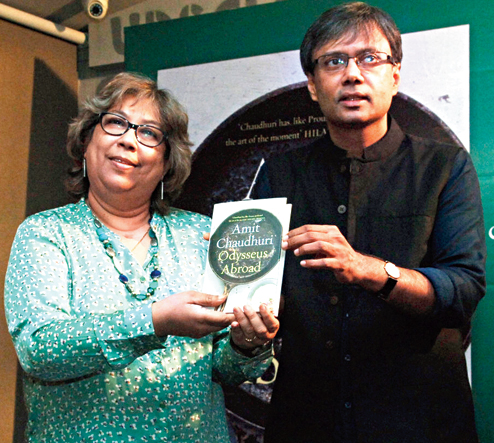 |
| Amit Chaudhuri and Sujata Sen at the launch of Odysseus Abroad. Picture by Bishwarup Dutta |
Metempsychosis (Greek). Met him pike hoses (Ulysses). Met him Sykes hoses (Odysseus Abroad). Transmigration of the soul. It happens. With books too. With books two.
Amit Chaudhuri’s story of how he got hold of the hero of his latest novel Odysseus Abroad, being widely regarded as his finest work till date, could read almost as an eye-witness account of the process.
Chaudhuri had an uncle, an unusual, brilliant, eccentric man, who had lived in London for more than three decades to return to India in the Nineties. After which Chaudhuri had had the temerity to buy an F.N. Souza charcoal etching and point it out to his uncle when the latter wanted to see it. “I heard that you paid Rs 55,000 for this painting?” his uncle asked. “You could have paid me Rs 55,000 for farting,” he added. “Do you notice the figure looks like you?” Chaudhuri had asked his uncle.
Though it had looked like a self-portrait, Souza had called it “Ulysses”. There was a lot in common between the artist and Chaudhuri’s uncle: both were very alive, both ranters, both having something fundamental to complain about always. And Chaudhuri’s uncle had undertaken great journeys. He saw in his uncle a Ulysses, if a parody of Homer’s original as was James Joyce’s Leopold Bloom, this one given to ridiculous conversations, Chaudhuri said.
He was speaking at the launch of Odysseus Abroad in the city on Tuesday at the restaurant Jhal Farezi, where he was in conversation with Sujata Sen, director East India, British Council.
Walking about London, Chaudhuri’s Ulysses, Rangamama, who also gets his kick from theories of after-life, can have an utterly serious conversation with his college-going nephew Ananda about what is more important to women, “love or sex”. Rangamama’s confident answer is sex, though Ananda suspects him to be a virgin.
But in the process of writing Rangamama, a great many books, or many great books, or at least two, got written into Odysseus Abroad (Hamish Hamilton, an imprint of Penguin Books; Rs 499), as the title suggests: Homer’s Odyssey and James Joyce’s Ulysses.
Chaudhuri feels his book has a deceptively simple surface, for much simmers underneath (“metempsychosis” also for the liver curry that Rangamama cooks, “mete” being the Bengali for liver, though Chaudhuri’s word-play is not quite as excessive as Joyce’s?) At the same time, Chaudhuri took great care not to frighten his readers.
No a priori knowledge of the European epics is required, Chaudhuri insisted. “It is enough for people to know that the book is loosely based on something,” said Chaudhuri, who gave the example of Vishal Bharadwaj’s Maqbool, which was based on Macbeth, yet it didn’t matter if the viewer didn’t have an inkling about Shakespeare.
So it’s ok if the reader does not know that Molly Bloom in Ulysses mispronounces “metempsychosis” as “met him pike hoses” and taking his cue from her, a young Rangamama and his brothers and sisters try a planchette in Sylhet where a dead schoolteacher spells out the following words: “Met him Sykes hoses”. Metempsychosis, which the ancient Greeks believed in.
And the super-alienated Ananda, an “unreconstructed romantic” studying English literature in the London of the Eighties, when Thatcher rules and novels are forced on him when all he wants is poetry, modern poetry in particular, is Telemachus/Stephen Dedalus to Rangamama’s Ulysses/Bloom. The alienation makes for a journey. And Ananda’s rowdy Indian neighbours are the “Suitors” who would annoy Penelope.
But it’s ok really if Rangamama and Ananda are read just as themselves, for there is enough going on in their lives, which includes their often hilarious preoccupation with the sex they are not having and other bodily functions. Despite everything they are journeying towards something huge and multifarious, which reveals itself ultimately from underneath the apparently easy-going prose.
Towards the end of the event, Chaudhuri spoke critically about the recent Indian trend of “research-based” novels. He said that this showed Indians as having a reverence for “facts” and being “distrustful of the imagination”, even when it came to fiction.











